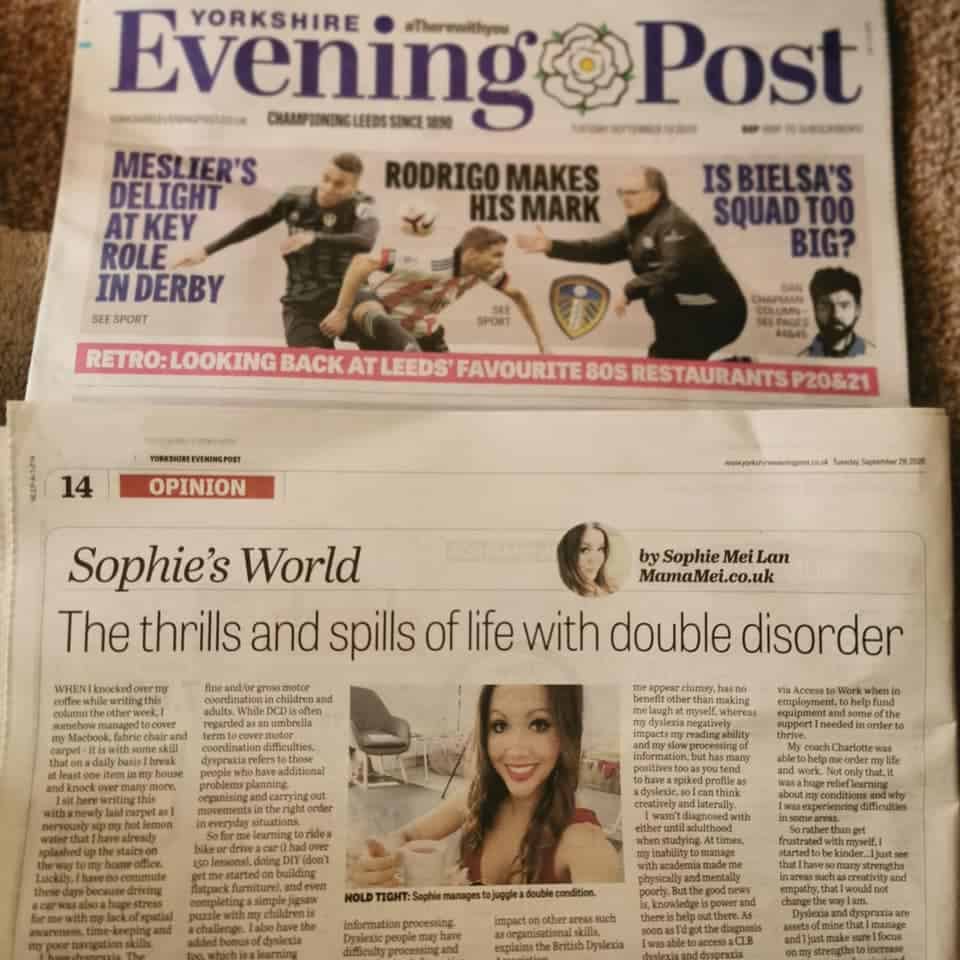When I knocked over my coffee to sit to write this column the other week, I somehow managed to serendipitously cover my macbook, fabric chair and carpet, it is with some skill that on a daily basis I break at least one item in my house and knock over many more.
I sit here writing this with a newly laid carpet cushioning the soles of my feet as I nervously sip my hot lemon water that I have already splashed up the stairs on the way to my home office. Luckily, I have no commute these days because driving a car was also a huge stressor for me with my lack of spatial awareness, time-keeping and my poor navigation skills.
I have dyspraxia. The Dyspraxia Foundation describes my condition as a form of developmental coordination disorder (DCD) which is a common disorder affecting fine and/or gross motor coordination in children and adults. While DCD is often regarded as an umbrella term to cover motor coordination difficulties, dyspraxia refers to those people who have additional problems planning, organising and carrying out movements in the right order in everyday situations.
So, for me learning to ride a bike or drive a car (I had over 150 driving lessons), doing DIY (don’t get me started on building flatpack furniture), and even completing a simple jigsaw puzzle with my children is a challenge.
I also have the added bonus of a dyslexia too which ‘is a learning difference.
‘It primarily affects reading and writing skills. However, it does not only affect these skills. Dyslexia is actually about information processing. Dyslexic people may have difficulty processing and remembering information they see and hear, which can affect learning and the acquisition of literacy skills. Dyslexia can also impact on other areas such as organisational skills,’ explains the British Dyslexia Association.

The difference, I find, between dyslexia and dyspraxia is the fact that dyspraxia which makes me appear clumsy has no benefit other than making me laugh at myself and my appearance in the media of having my life in order compared to my reality of living like Sonic the Hedgehog in a whirlwind. Whereas my dyslexia, which for me as we all present differently, negatively impacts my reading ability and my slow processing of information or directions as well as my inability to follow a linear order or a system, but it has many positives too as you tend to have a spiked profile as a dyslexic, so I can think creatively and laterally. It’s just thinking within a box that is my difficulty, not to mention understanding simple passages of text.

I wasn’t diagnosed with dyslexia and dyspraxia until adulthood when doing my post-graduate diploma in Journalism following a degree in Philosophy and Italian because I had unknowingly adopted my own coping mechanisms and also avoided certain situations at all costs. At times, my inability to manage with academia made me physically and mentally poorly.
But the good news is, knowledge is power and there is help out there. As soon as I’d got the diagnosis I was able to access CLB dyslexia and dyspraxia support coach who helped me to organise my schedule, she helped me to learn in a visual way and also I was able to get support at university and via Access to Work when in employment to help fund equipment and some of the support I needed in order to thrive.
WATCH HOW I THRIVE WITH DYSLEXIA AND DYSPRAXIA, HERE: https://www.facebook.com/watch/?v=743846342861158
My coach Charlotte even helped me to learn shorthand through a range of techniques until we found something that worked for me, she was able to help me order my life, work and even support time planning. Not only that, it was a huge relief learning about my conditions and why I was experiencing difficulties in some areas. So rather than get frustrated with myself, I started to be kinder, the more I understood the fact that I may struggle with a lot of society’s systems but that I was gifted in many other ways and I just see that I have so many strengths in certain areas such as creativity and empathy, that I would not change the way I am.
I even manage to dance and exercise for a living alongside my work as journalist, three careers you may not think possible for a dyspraxic dyslexic. But I bellydance which is improvised, I work well visually when it comes to fitness and I can express myself in my own style through writing, film-making and editing. My brain is unique but I am grateful for my talents and I have even finished writing my first book which is long form content so I knew I needed a publisher and editor to make sure it made some logical sense.

So, whilst my work space today is better set up to avoid another spillage and to concentrate on writing this column, I had no problem in thinking of ideas of what to write, but I learned that I have to carefully set out a structure first, carefully rely on spellcheck and I am lucky to have a patient editor.
Dyslexia and dyspraxia don’t stop me from being an author or broadcast journalist or dancer, they are assets of mine that I manage and I just make sure I focus on my strengths to increase my ‘moments of genius’ and to ask for support for my weaknesses which is a good lesson in life for us all.
Sophie’s published book Eat. Sleep. Control. Repeat. which documents her ‘perfectly imperfect’ life is available now on hallgoodbooks.com and amazon.
October is Dyslexia Awareness Week (from 6th) and also Dyspraxia Awareness Week (from 5th).
MY ARTICLE AS PUBLISHED IN MY WEEKLY NEWSPAPER COLUMN IN YORKSHIRE EVENING POST.
